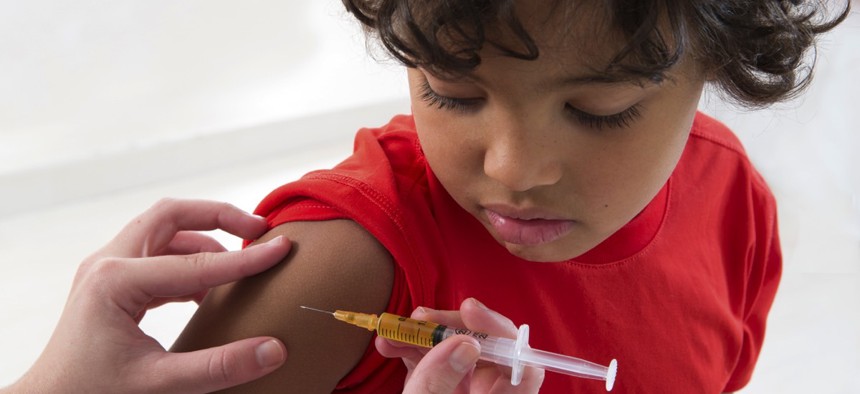Policies States Should Implement to Boost Child Immunization Rates

Data on policies strongarming parents is lacking, but rejecting nonmedical exemptions is a start.
State governments should pass laws that encourage higher child immunization rates, namely allowing only medical exemptions from vaccine requirements for school and child care, according to the a new policy statement from the American Academy of Pediatrics issued Monday.
While all 50 states, the District of Columbia and Puerto Rico legally require proof of immunization for school and child care attendance, according to the AAP, most undermine their own public health strategies with codified nonmedical exemptions.
The AAP supports medical exemptions to specific vaccines on a case-by-case basis but not the religious belief exemptions allowed in almost all states and philosophical exemptions allowed in almost half—despite the lack of a federal mandate.
“It’s clear that states with more lenient exemptions policies have lower immunization rates, and it’s these states where we have seen disease outbreaks occur as the rates slip below the threshold needed to maintain community immunity,” said Geoffrey Simon, lead author of the statement and former chair of the AAP Committee on Practice and Ambulatory Medicine, in the announcement. “Non-medical exemptions to immunizations should be eliminated.”
Unvaccinated children tend to be geographically clustered, forming pockets at greater risk of infection—like in California in January 2015, where 3 percent of unimmunized kindergarteners were responsible for spreading measles.
Community immunity protects even those children who can’t be vaccinated for medical reasons or because they’re too young. That’s why the AAP encourages public health agencies to release immunization rate data to provide parents with greater context.
“People today may not remember that before vaccines, diseases like whooping cough, measles, polio, meningitis, and diphtheria sickened and claimed the lives of thousands of children and adults each year in the United States,” Dr. Kathryn Edwards, member of the AAP Committee on Infectious Diseases, said in the announcement. “Serious disease can occur if your child and family are not vaccinated.”
Edwards authored a coinciding report, “Countering Vaccine Hesitancy”, which estimates vaccines will prevent 42,000 early deaths and 20 million disease cases saving $13.5 billion in direct costs and $68.8 billion in societal costs among those born in 2009.
The report suggests states consider requiring mandatory physician visits or education for parents seeking exemptions, though the effectiveness of such a policy is unclear.
There is also no published data on the success of “vaccinate or be dismissed” policies, according to the report.
Dave Nyczepir is a News Editor at Government Executive’s Route Fifty and is based in Washington D.C.
NEXT STORY: Tropical Storm to Bring Heavy Rain to Florida; Will Baltimore’s Drug Problems Alter Local Aquatic Life?






